We’re delivering our Game of Thrones recaps in a series we call Game of Thrones Unlocked. These articles will contain spoilers through the episode under discussion. This week, the whole crew tackles “The Dragon and the Wolf” (Season 7, Episode 7).
The End of the Game of Thrones
Sansa pretty much spells it all out: Littlefinger started the War of Five Kings. He helped Lysa Arryn poison Jon Arryn; he had the letter sent to Catelyn to bring Ned Stark to Kings Landing; and he lied about the provenance of the knife that was used to try and kill Bran Stark (which begat Catelyn Stark seizing Tyrion Lannister on the Kings Road, which begat the seizing of Ned Stark; which begat, which begat, which begat….) The entire story we’ve been watching was all a bouncing ball set in motion by Littlefinger.
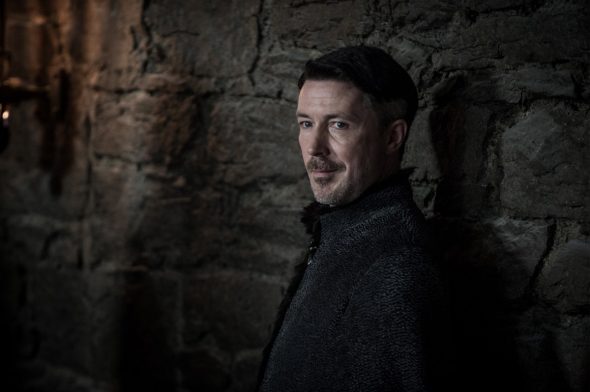
Except that’s not true. Two characters had plots there were entirely separate from what we might more accurately call “Littlefinger’s War”: Jon Snow’s (sorry, Jon Sand [sorry, Aegon Targaryen]) fight first against the Wildlings and then against the Night King, had pretty much nothing to do with the machinations of Littlefinger. And Daenerys Targaryen’s battle for survival and then dominance in Essos was only incidentally connected to all of this.
For every season up to this one, we’ve really been watching three shows-within-a-show:
- A Song of Ice: Jon Snow fights above the Wall
- A Song of Fire: Daenerys fights in Essos
- A Game of Thrones: Everything else (i.e. the stuff that Littlefinger set into motion)
Sure, individual characters might cross from one story to another, and events from one might bleed into a different one, but you could easily imagine a world where each of these “shows” is in fact a separate series, and occasionally they do crossovers a la Hercules and Xena the Warrior Princess.
Of the three “shows”, the “Game” part of the series is arguably what people think about when they think about Game of Thrones. Sure, we all love us some dragons. And the Jon Snow and Dany plot lines had some great moments (I will love the “dracarys” video until my dying day), but for the most part these stories lacked the punch that the big Westeros moments had: Ned Stark loses his head. The Red Wedding. Cersei blows up the Sept of Baelor. These were the big “Oh my God!” shocks that got people talking.
And when you look back at the series, you realize that for all the blood and guts, the Game of Thrones was never chiefly a contest of arms. Sure, there were battles, but very few of those were pivotal to the plot—other than perhaps the Battle of the Blackwater, battles that involved a force-on-force conflict between roughly equal foes were almost non-existent.
No, the “game” was all about forging backroom deals and arranging for shocking betrayals. You defeat Robb Stark by luring him to a wedding and subverting his allies, not by fighting him in the field. You gain influence with the throne by murdering Joffrey and marrying his dull-but-good-natured brother. You get rid of those scheming Tyrells and meddlesome priests by blowing them up without so much as a warning. That is how you play the game of thrones.
And because the series started off by killing the main character, it always seemed like these betrayals could kill off on any character at any time. Which was never true for Jon and Dany. On those shows, we knew Our Hero was going to pull it out in the end. As I’ve argued before, Jon and Dany were Chekov’s gun, and they couldn’t really fulfill their role in the story until they returned to the center of the action. We knew they were safe, no matter how bad things got. Even when Jon was literally dead, we all kinda knew that he was probably fine?
So when Jon Snow rode south, and when Daenerys sailed east, this got scrambled. All of a sudden we were really only dealing with one story. As Jon Snow puts it, only one war matters—and that war is here. The Song of Ice and Fire is here, and the Game of Thrones is over.
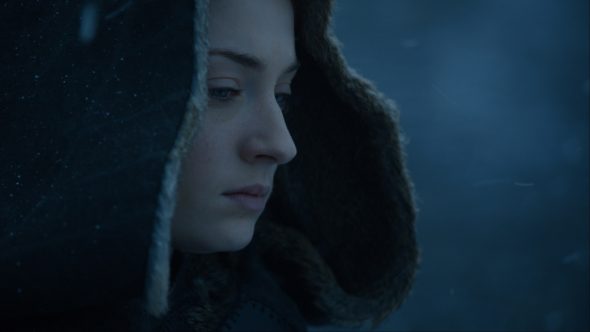
Which leaves Littlefinger in a bind. Because that’s the only game he’s good at. He’s great at palace intrigue and turning one house against another. Despite being from a minor house, he’s risen to the highest ranks of nobles and Lords, within spitting distance of the throne. Littlefinger is to the Game of Thrones what Michael Jordan was to basketball.
But as Jaime says to Cersei, “This isn’t about noble houses, this is about the living and the dead.” The scheming is done. What’s left to play out is almost exclusively a contest of arms: Dany’s army and two dragons vs. the Night King’s army and one dragon on the other.
And in that game, Littlefinger is more like Michael Jordan playing baseball. Even Cersei’s betrayal-play with Euron and the Golden Company is just an extension of this larger war. Whatever happens up North, Cersei won’t be able to negotiate or try some intrigue with the victor: the Night King doesn’t seem to have the capability of negotiating, and a victorious Dany would have no patience whatsoever to negotiate with the woman who has betrayed her twice. From this point on, everyone is “entirely capable of waging war without meeting face to face.”
So from a story telling perspective, it was time for Littlefinger to exit stage left.
And what a glorious exit it was. I can claim at least some credit for calling this out in our comment thread from last week. After 7 seasons of brutalizing Sansa, she finally got to show that it wasn’t all for nothing; she finally learned not only how to recognize when someone was working a game on her, but learned how to do something about it. The whole “Do you deny it?” sequence was awesome, because it showed just how much Sansa had learned.
The shadow of Ned Stark loomed large in this episode, prompting lots of people to do lots of maybe not so smart things. Sansa and Arya break free of that trap, when they nod at one of the first things we heard Ned Stark say, all the way back at Episode 1: “The man who pronounces the sentence should swing the sword.” Only, Sansa’s not very good at swining the sowrd, and Arya probably shouldn’t be the one to pronounce the sentence (what with being a sociopath and all). So they compromised, and Littlefinger’s war was over.
—Ben Adams
Wolfpack Assemble!
The biggest open question after the last episode—well, aside from “Will Dany and Jon do it?” or, like, “Ice Dragon WTF?”—was, “Is Arya and Sansa’s feud real, or is this a feint meant to throw off Littlefinger?” In my last recap, I expressed dismay that the sisters had learned so many life lessons so hard only to be taken in by such a soft ploy, and in the comments, we tried to game out every possible contingency: was it a long con? Was Brienne’s abrupt dismissal on an errand related somehow?
And you know, they actually managed to resolve it pretty well. It was a little paint-by-numbers, but it rang true.
LITTLEFINGER: I like to play a little game where I assume the worst. Oh also, I am the worst!
SANSA: OMG what if Arya came here to kill meeeeeeeee?
LITTLEFINGER: Well, why would she do that?
SANSA: To become the lady of Winterf—oh, wait…
Especially given the miasmal cinematography in Winterfell, which obscures the subtleties of human expression, it’s a credit to Sophie Turner’s performance—she and Masie Williams are really good in this show, and they don’t get the credit that, say, the Peter Dinklages do—that you can see the individual steps in her realization. Arya has absolutely zero interest being Lady of Winterfell! She must not want to kill me and take my place! Littlefinger is every bit the manipulative tool we though the was.
It’s good to see the sisters united. The division of the Starks is the show’s original sin, the primal wound we viewers long to see healed. And as they stand on the parapets of Winterfell, they acknowledge the wound and recall their father and his sayings: “When the cold winds blow, the lone wolf dies, but the pack survives.”
I spent most of my time in my last recap talking about teaching and learning, and it’s difficult not to pounce on this lesson, passed from generation to generation. Arya and Sansa—and, presumably, Bran and Jon when he gets back—are a pack. The alliance of Jon, Dany, and nominally Cersei is a pack, or should be. These groups are designed for survival, and the Ice Dragon-shaped existential threat to humanity ought to remind us that anyone breathing is really part of one big pack, whatever our position in the Westerosi game of thrones.
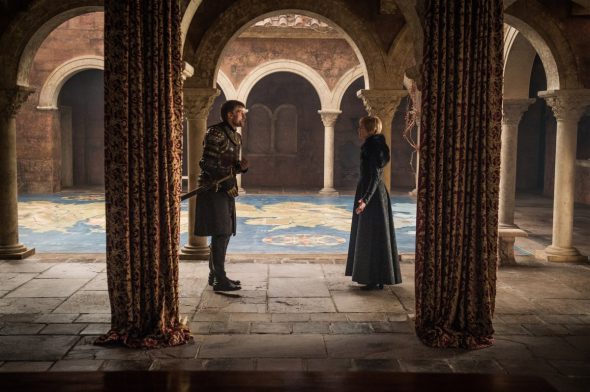
The whole of the epsiode is concerned with who is going to team up and who owes whom allegiance. Cersei insists that nobody leaves her, but Jaime rides for Winterfell; Jon won’t lie about bending the knee; Bronn knows what side his bread is buttered on; Theon can’t abandon his sister; Cersei can’t raise a hand against her brothers. The packs are based on family, on shared interests, on self-interest… but eveyrone is scrambling for one, and Littlefinger, the lone wolf, meets his ignoble end, with all the implications Ben has said.
The worst thing I learned in the course of recapping this episode of Game of Thrones is clicking around for others’ takes and finding out the AV Club is now on Kinja.
But the best thing I learned is that the show has formed ranks for the existential battle we always knew was coming, with Cersei, who is most definitely the worst, playing spoiler. However we got here—and there have been one or two missteps this season, if only because of its headlong pace—we can see where we’re going, and we can’t wait to get there.
#tormundlives
—Matthew Wrather
Game of Thrones is Lying to Us
This season of Game of Thrones was a lot better than the last season. I want to say that right off the bat. The show runners seems to have remembered how to build tension and whatnot. Which is good!
Unfortunately, the main way that they’re doing it these days is by lying to us. There were three, maybe four achingly tense moments in this episode that had me on the edge of my seat. Like take the moment where the Hound opens up the zombie container, and the camera slooowly zooms in: Why isn’t the walker moving?! Did the corpse just fall apart in there? Was this all for nothing?
Well no, obviously not. How dumb would that be? The zombie is going to come out of the box—all the interesting storytelling possibilities lie down that path. The show is just lying to us: making it seem like the zombie-in-a-box might just be a corpse-in-a-box (at which point I think the box technically becomes a coffin). And I honestly resent it.
Sure, you’ve got to milk this moment a little. But they milk it far too long. Especially because we basically just saw the Hound poking at the box, and heard the zombie go nuts inside in response. We’ve been given no reason to suppose that the zombie wouldn’t still be active, except that the show wanted to juice up the tension.
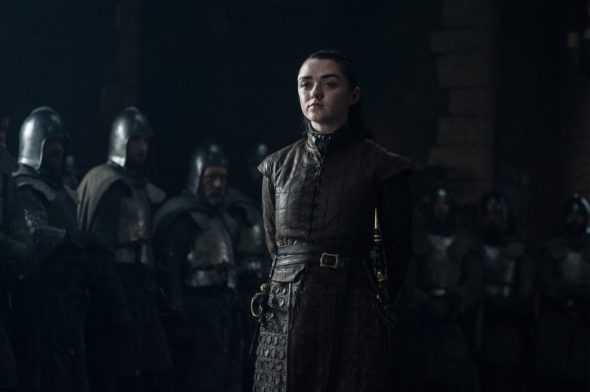
Similarly dishonest is the beginning of Littlefinger’s trial. Why, why why why have it start off like it’s supposed to be Arya’s trial? Because the show’s been steering us in that direction all season, of course — but what in-world reason is there for playing it like this?
I’d even say that something similar is going on with Cersei’s part of the episode. It was kind of interesting that Euron up and ran when confronted with the reality of the white walkers. It was certainly interesting when Cersei decided to fight on the side of light and good! Was it interesting when both of those plot developments turned out to be errant bullshit? I don’t think it really was. It was dramatic, certainly. Surprising. But not really interesting: it means that all of the stuff that happened at the Council of Surviving Characters had absolutely no effect. Going into the meeting, Cersei’s plan was to pretend to make peace while still actually making war. Everyone else’s plan was to head north to fight zombies. And coming out of the council, that’s exactly what everyone did. Which means that this wasn’t a decisive episode: it was a bunch of staring and shouting, disguising the fact that all of the decisions had already been made weeks ago.
Finally, let’s talk about the final reveal (although honestly we knew all of this already). Jon is really a Targaryen! He’s the true heir to the Iron Throne!
“We have to tell him,” says Bran, the seer-touched resolver of Dangling Plot Threads.
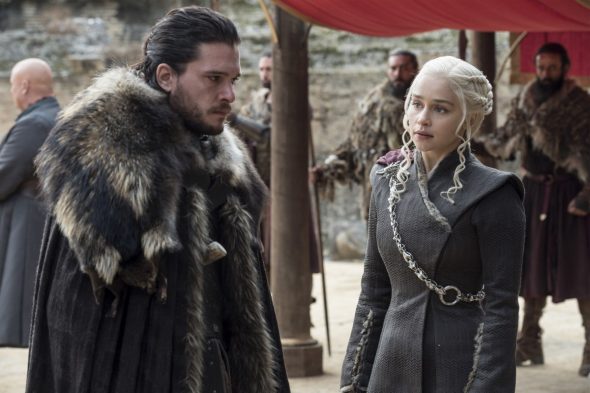
NO YOU DO GOD-DAMN NOT HAVE TO TELL HIM. What purpose could there be for telling him? In what possible world is that a good idea? Remember that this is a whole episode about how it’s time to put aside our petty squabbles and unite against a graver enemy (whether it’s Littlefinger or the Zombie army). Why end it with Bran giving Jon and Dany something petty to squabble about? Did the Three-Eyed Raven foresee that the show was running out of material for it’s B-plots?
Uggggh, why would it help to tell him? From a psychological point of view, what’s the upside to telling a grown-ass man, who is reasonably well-adjusted and cherished his relationship with his father, that his father was actually not his father, and that his real parents were horribly murdered? “You seem to be fine, but what if you had a whole trash-bag full of childhood trauma that you didn’t even know about?” From a realpolitik point of view, literally no one is supporting Dany’s claim on account of her being the true Targaryen heir. She has the purest claim, sure, but that’s not why she’s winning. It’s because she has the army, and the dragons, and the other army. Does any of that go away just because Jon is suddenly her nephew? “You are the true heir to the throne! That and a buck fifty will buy you a ham sandwich, though, so you might as well go back to schtupping the false heir to the throne. Oh excuse me, I guess she’s Aunt false-heir-to-the-throne, to you.” And again from a zombie army point of view, why on God’s green earth would you not wait until after the army of the dead has been defeated before sewing discord between the leaders of the anti-deadite coalition?
So yeah: the notion that we’ve got to resolve the mystery of Jon’s parentage is just a big floppy turd of a lie. Probably the most heinous dishonesty that the show has tried to sell us.
Watch, now it’ll turn out that Bronn and Podrick didn’t even really go for a drink.
—Jordan Stokes
Seven Kingdoms of Highly Effective People
Game of Thrones has been a murder mystery, a pseudo-historical epic, a magical fantasy adventure, a war story, a road story, half a dozen coming of age novels, a social treatise, and an ecological disaster story. I was glad to see that this season end with the greatest genre of all: anecdote-driven career advice.
Looking for ideas to torpedo your next project? Drive your next team dynamic into the ground? Doom your entire company? Just frustrate people on a lark? Game of Thrones was there for you this week, teaching you all about how to have unsuccessful meetings, and we’re here with the bullet points summary. Because nothing says “I just watched a bunch of bad meetings on television for 90 minutes” like a bullet point summary on a pop culture website.
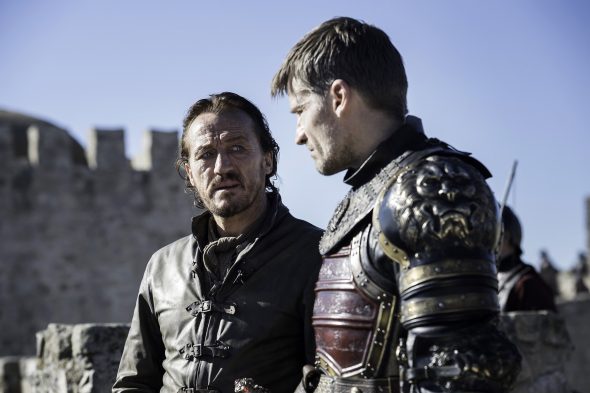
- When your boss asks you a serious question about your job and your career, answer with dick jokes. As long as it’s true, it doesn’t matter if it’s relevant. Bronn and Jaime, failing to agree at an understanding of their future plans.
- Be late. Bonus points if the meeting is with a client, prospect or potential business partner who has never met you before. Daenerys, dramatically arriving and immediately ceding her rival’s respect.
- Never hold a meeting in a place designed for meetings. Try a prison, or an animal shelter, or a non-functional sports arena. Or all three! The dragonpit, hopefully with some sort of backup rain option.
- Tables are for chumps! No tables! And whatever you do, never write anything down! If off-the-cuff verbal agreements shouted at each other over the flagstones can’t run the world, nothing can! Is somebody going to raven out minutes to everybody? Do they even have paper for the agreements they were proposing to make? Was Qyburn the only maester there? Was there one in the background I missed? Who is sending the ravens if neither Jon nor Daenerys have a maester?
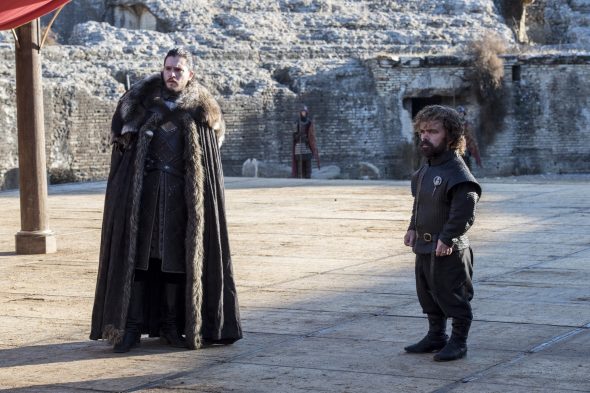
- Do not clarify who is starting the meeting or provide an agenda. The person who talks first can be the person who wants it the most. Or maybe the person with the soonest birthday. Try it in reverse alphabetical order! Mix it up! Tyrion stumbles out into the long and awkward silence to explain to everybody why they are there, but can’t get past it, because it would be wastefully competent if everybody already knew the basic purpose for an international conference, or if it had some kind of formal programme. Maybe they decided writing up an agenda would require them to spell out everyone’s titles, and nobody actually knows all of them?
- If you have an issue unrelated to the main purpose of the meeting, bring up your shit in front of everybody right at the beginning. Bonus points if it involves a junior associate from somebody’s else’s team who is mostly sitting in just to watch. Euron came here to talk about Euron. Everybody else can get the hell out of the way!
- Demonstrate any new product or technology live for the first time in front of senior leaders with no dry runs or practices. Especially if it is loud or dangerous. Use actual prototypes rather than illustrations. Do not tell anyone what is supposed to happen. Not only might it go horribly wrong, but if it doesn’t, it might still scare or anger people, making it harder to focus on the task at hand. Sandor Clegane shows up with the least ergonomic method of carrying a crate ever devised, determined to wait out the rest of the war on disability. The demonstration meant to sway Cersei to the side of cooperation turns out to only deepen her isolationism.
- If you don’t like what is happening at a meeting, just leave. Whenever you want. Make some sort of fake excuse and walk out in front of everybody so they all know you left. Euron talked about Euron! That’s what Euron came here to do! Euron out!
- If you run into a potential problem or impasse, draw a line in the sand and say nothing can be done. Jon Snow, or Jon Sand, “ruining everything” by bringing up a problem that everybody could have anticipated and also could have potentially discussed at the meeting they were all at to discuss problems.
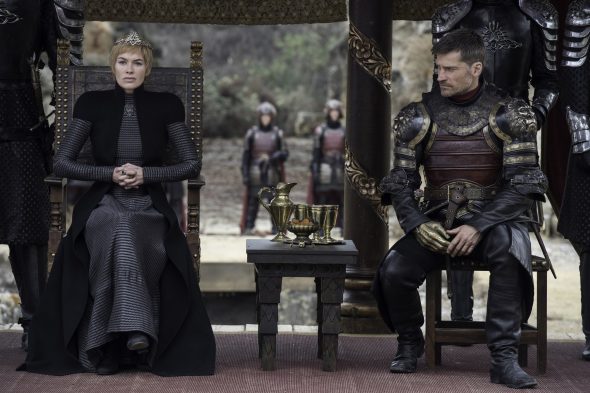
- If you run into any sort of impasse or sticking point in discussing a problem, immediately cancel the remainder of the meeting, all other meetings, and the entire project. Send anybody who has traveled for the meeting immediately back to the airport or train station, or they can call Ubers. Who cares? Well, Cersei walked off pissed about surprise revelations about alliances we haven’t entirely sussed out. Hey, the King’s Landing Chili’s has a special on goblet margaritas! Last one there’s a rotten Aegon!
- For any one-on-one meetings that happen after hours, make it personal. Also, drink with them, and trust everything they say in private as if it were said in public. Tyrion shows us that when meeting with a foreign head of state, doubling down on their dead children is the way to go.
- When, as a mid-level participant, you get the chance for an informal side conversation with a counterpart from another group or team, lead with cursing out your own boss and your commitments to them. That way you’ll immediately know if they find their job as pointless as you find yours. Brienne massively breaking character with her “fuck loyalty” speech, which confused us as much as it confused Jaime.
- When someone junior to you approaches you with a problem or concern, rhetorically ask, “What does this have to do with me?” and walk out. By “delegating” their problem back to them, you teach them self-reliance! Jon treating Theon like family. Theon has garbage family.
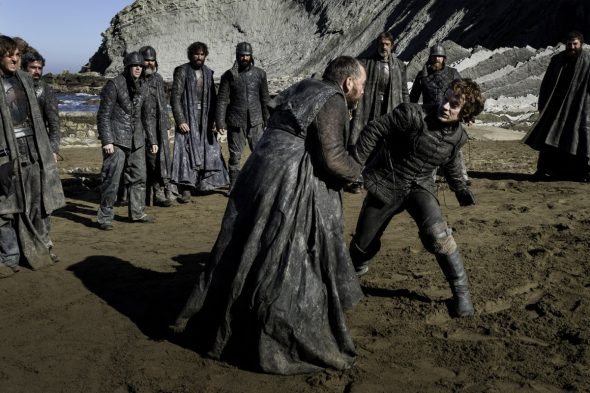
- In tense public meetings with your most talented employees who have shown outstanding performance on multiple occasions but are having current performance issues, beat them to death. Seriously, that guy Theon was beating on (Dagmar Cleftjaw, maybe?) looked to be in very rough shape. Theon may have got his men yelling, but presumably Dagmar or whoever he was wasn’t the only guy on board with the “rape a whole island” plan. I’m not sure Theon convinced them otherwise. Also Theon forgot to get in a boat.
- And in any private meeting with a senior employee of yours with considerable experience and responsibility in your organization, kick it off by calling them an idiot and threatening them. They will be so impressed with how little they have been told about what you expect them to do that they will stop working for you entirely! Cersei may have just wanted to fire Jaime, but this way she got to confuse and alienate him first!
- When a meeting ends with making a very important, critical decision, just nod. It doesn’t matter whether it’s clear whether a nod means “yes” or “I agree with the last thing that was said” or “let’s move on to the next topic” or “this meeting is over.” If you had to say what you wanted before underlings did it, what would be the point of underlings? Saying it is like half the work! Delegate! Cersei sort of giving the order to kill Jaime, except not really, except maybe?
- When working with younger talent on complex practical matters, tell them you love them often, and also that you think their parents are attractive. This will cast a sort of “shadow” over all the “other important things you are supposed to be working on” and make it “impossible to reasonably collaborate on projects.” Littlefinger’s strategy of accomplishing nothing while sexually harassing his way into deeper and deeper irrelevance.
- If you need to let an employee go, make the job they were doing for you the last thing on your mind. Their responsibilities, communications, or goals – or even what you might not know about what they have been working on – are irrelevant once you’ve made the decision to move on without them. So, invite the employee to a surprise meeting with dozens of their coworkers and dramatically and permanently can them in front of everybody. Why was Sansa even keeping Littlefinger around in the first place? She could have had him killed at any time. Presumably there had to be some sort of reason. What we he even doing within her administration other than standing in hallways? And yet at his execution nothing was ever mentioned. It will be very hard to train a replacement to pick up his projects. Also, you know somebody in that room was assigned to bring the mop, and is probably hoping that if they are really slow to get out there and start cleaning everyone will forget who they asked and send somebody else.
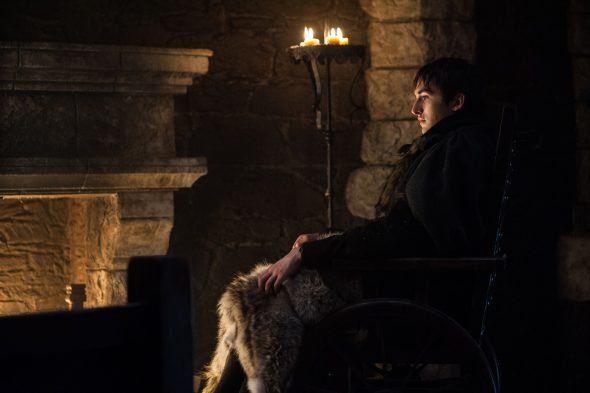
- When meeting a potential new hire for the first time, do not tell them anything in advance, and make the interview process as uncomfortable and confusing as possible. Hold the meeting in your bedroom. Don’t introduce yourself or ask them to introduce yourself, just tell them what their name is. List your formal job title but never describe your responsibilities. Bran desperately avoiding inspiring too much confidence in Sam Tarly. If people had confidence in Bran and knew what he was doing, he would come to them with their problems or ask him to tell them what to do – you know, they would want to work for him. And that’s just tedious when all he wants to do is smoke trees and offer inadmissible legal testimony. Better to pawn any latecomers off on other managers by being deliberately obtuse.
- And, of course, when in doubt, bone your boss. Doing this can only end well. As Jon Snow / Aegon Targaryan taught us, if you get back from a conference without 90 million people seeing your butt, you are not conferencing hard enough.
BONUS: Remember, in the unlikely event of an emergency, designated evacuation managers will yell “RUN!” at the top of their lungs, as everyone scrambles blindly through the tangle of geometrically impossible interlocking staircases. You may not find your way out, but as you’ll read in page 42 of the employee handbook, “Valar Morghulis.”
—Peter Fenzel
That’s it for Game of Thrones Unlocked Season 7! How did you like this abbreviated season, and how well did you think Episode 7 wrapped it up?
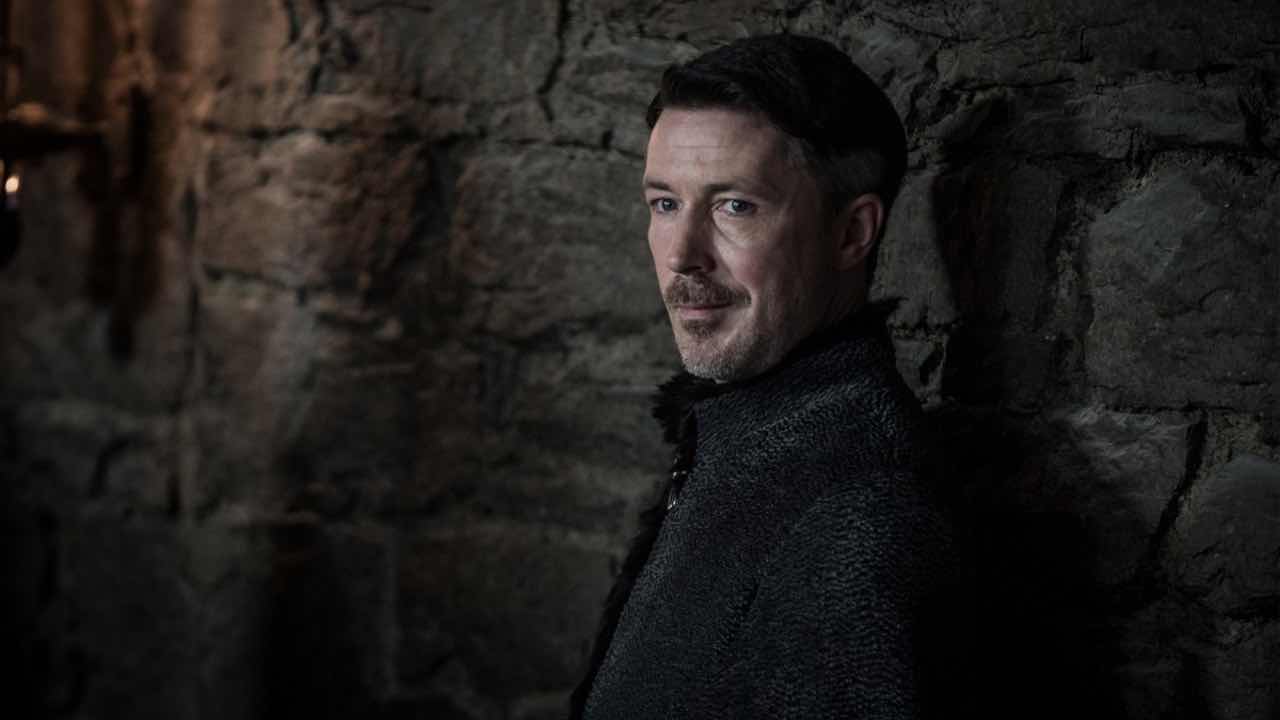
For reasons discussed in your post above, I liked that this episode was so talky. Good acting and writing can make such scenes riveting. Too many battles tend to lose their impact.
For a horrible moment I though Arya was already wearing her Sister’s face and Littlefinger was calling her on it. (I suppose we have established that wearing a face means also gaining the person’s height.) But Arya doesn’t seem interested in being Lady of Winterfell. I’m glad what’s left of the Starks reconciled, it was sad that Arya’s and Sansa’s relationship seemed to have dissolved into feud about who has suffered more.
Does Jon even want the Iron Throne? Also: more incest!
I predict Jaime is going to join his brother Tyrion and Co. next season.
Nitpick: how can Vicseron the Zombie Dragon achieve lift with holes in his wings? I’m worried about Tormund Giantsbane, he’s a very tough guy but the Wall did collapse.
I absolutely loved these recaps you guys did for this season of GoT. Jordan somehow managed to perfectly express everything I felt while watching this episode. Except the whole Cersei bit.
The thing is, you joked by saying: “Watch, now it’ll turn out that Bronn and Podrick didn’t even really go for a drink.” but that was when I was half-ready for the whole arena to explode in green fire because I suddenly because super-suspicious and distrusting of Cersei.
Weirdly though, after that I was caught up in the excitement and didn’t really suspect anything else.
So, I was like: “Sure, Cersei’s gonna uphold a truce, sure Euron’s just going home, but that Podrick! He’s up to something!”
CORRECTION: Overthinking It would like to apologize for the claim that nobody planning the Trilateral Dragonpit Conference on Existential Threats to Humanity thought to bring any tables. There was a small table for the booze. Overthinking It regrets the error.
Here’s my question:
What the hell is Ice Zombie Viserion shooting out of his mouth?
Is it ice? It doesn’t turn white and snowy or misty at the edges, which is what I’d expect ice breath to look like. Also how would Ice Breath bring down the wall? It’s already frozen.
Is it fire? But if it was super hot blue fire it would be yellow and orange at the edges, like the flames on a stove burner. And the whole point of the army of the dead is that it’s all based on ice, would the dragon still breath fire? Also, the wall seems to be breaking, not melting.
My best guess is some kind of super concentrated blue zombie magic energy. Which, frankly, is kind of lame. I get that it’s the same color as the eyes of The Others and the dead, but shouldn’t we have had some precedent for this energy to be used as some kind of Street Fighter style energy blast?
Also, I didn’t really care how badly plotted the Arya/ Sansa/Littlefinger stuff was. I was too happy to watch Littlefinger die to care.
And finally, I think since a couple of weeks ago we all really got on Sam’s case, we should acknowledge that apparently he did hear what Gilly said and went back and looked at the book she was reading to him. I hope he apologized for his rudeness towards her, though.
Actually, come to think of it, did Sam shout down Gilly’s discovery and then turn around and *take credit* for it? (Maybe he does have a future in academia.)
So I think the most charitable reading is that Sam had already read the book that Gilly was reading to him – he says to Bran that the reason he knew it was because he had transcribed the diary. Maybe that’s why the book was even in his room for Gilly to read in the first place?
oof, Stokes, that didn’t even occur to me.
I’m gonna go with Ben’s charitable explanation. Because it makes me feel better. (Though it probably doesn’t hold up to much scrutiny)
Come to think of it, I don’t know why I’m so invested in Sam not being a tool. But I did kind of perk up while watching the episode and thinking that maybe he hadn’t been. (Granted, he should have given Gilly credit, though I’ll forgive him based on the “talking to Bran is always super weird” excuse).
I agree, I really want to know what Viseryon is breathing. It feels like if it’s fire, he should just immediately combust. Dragon or not, he’s a zombie, and zombies are flammable.
So the White Walkers aren’t actually animated by Ice Magic right? I’m probably a little light on lore, but we’ve only seen them use cursory forms of IM, with everything else being a general kind of Generic Magic. Presumably the WWs aren’t animated by cold alone? Although the Oathkeepers (apparently the name for the necromancer/lich WWs?) do shatter into ice when hit with the right weapons and bring ice storms with them. This could be possibly just be some kind of magical force pressure whipping up the snow (think Dragon Ball ki), since we’ve never actually seen them outside of a snowy setting.
My working theory is that they’re animated by what I’ll choose to call Arcane Magic, that that’s what the dragon is breathing. Arcane Magic in RPGs is traditionally a ‘force’ magic with physical weight as well as damaging properties, hence why it could blow though The Wall. I have noted the dragon fire displaying certain physical properties as well however.
I like this explanation, thanks.
But I’m gonna keep calling it Ice Blue Magic, because that’s how I’ve been thinking of it.
If I may be so bold, an addendum to your excellent Seven Kingdoms of Highly Effective People
Piece:
Arrive via the biggest, most obnoxious means of transport possible. Make an entrance! Dany arriving on the Dragon that breathed on Cersei’s army is like pulling up in a huge Hummer when everyone else came by public transit, bicycle, or maybe a sensible hybrid car.
Nothing wrong with a hybrid Camry, right Pete?
To quote the late great Barristan Selmy from the books:
“She wants fire, and Dorne sent her a hybrid Camry. You could make a poultice out of a hybrid Camry to cool a fever. You could plant seeds in a hybrid Camry and grow a crop to feed your children. A hybrid Camry would nourish you, where fire would only consume you, but fools and children and young girls would choose fire every time.”